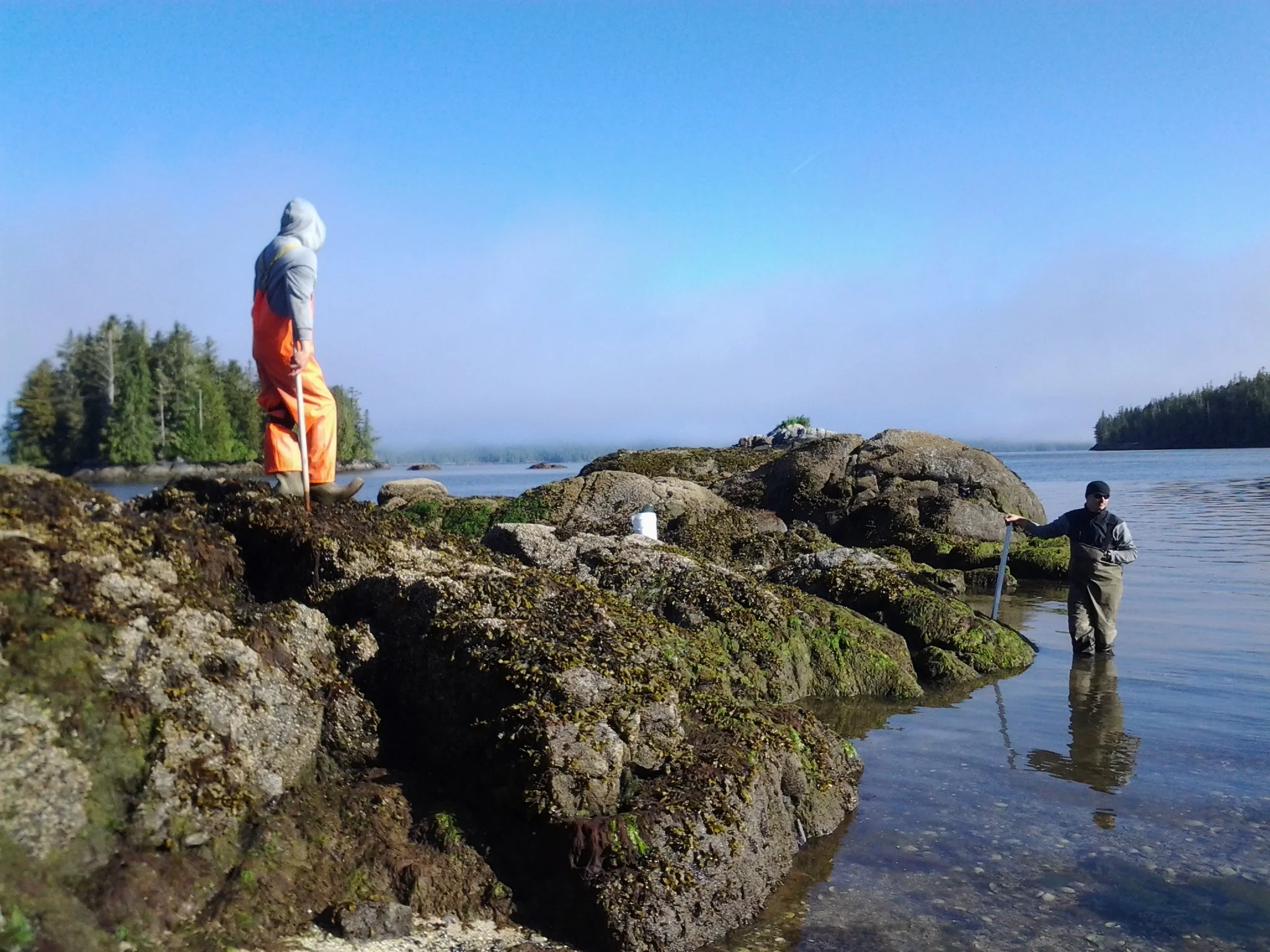By Anya Blaney
Ocean scientist and TNC in Washington trustee Marco Hatch creates opportunities for under-resourced students to pursue higher education while revitalizing ancestral clam gardens.
As climate challenges unfold, clam gardens remain a testament to the resilience of Indigenous people and nature. These intertidal structures—where the land and sea meet during low and high tides—are vital to maintaining healthy waters and sustainable food systems. Coastal Indigenous peoples in the Pacific Northwest have built clam gardens for thousands of years, helping them adapt and thrive during environmental uncertainty.
© Marco Hatch
Marco Hatch, a Samish Indian Nation member, scientist, and board trustee for The Nature Conservancy (TNC) in Washington, admires the resilience and cultural significance of clams and other tidal species. He channels his passion as an ocean scientist into creating opportunities for students, including those from Indigenous communities, to pursue careers addressing critical climate challenges.
Marco believes that people can create a better world by looking to many ways of knowing, including Western science and traditional knowledge, to help nature and humans coexist. As an Associate Professor of Environmental Science at the College of the Environment, Western Washington University, and a trustee for TNC in Washington, he combines traditional ecological knowledge and emerging technologies with a focus on food systems.
His connection to the ocean and marine ecology began in early life. Marco grew up playing on the beaches of the Hood Canal, a fjord formed by a retreating ice sheet about 13,000 years ago between the Olympic and Kitsap Peninsula. He found joy in digging up clams and chasing shore crabs. Today, he leads a resurgence in clam gardening, a sustenance staple for Samish people. When the Samish Indian Nation established an internship to fund students’ college expenses in 2002, Marco began studying at the University of Washington (UW) with the goal of “incorporating Indigenous knowledge in the marine sciences.”
“During my internship, we camped out doing a variety of ecological, cultural, and archaeological projects in the San Juan Islands,” Marco said. “Working with the Samish Tribe taught me to see land and seascapes not as they are today, but as they were before human contact, and find what species are missing that were once abundant.”
After completing his internship and graduating from UW, Marco temporarily relocated to San Diego to study at the Scripps Institution of Oceanography, where he earned a doctorate in Biological Oceanography, the study of how marine organism communities interact with each other and their environment. As a professor at Western Washington University (WWU), he leads the university’s Coastal Communities and Ecology Lab, where he and his undergraduate and graduate students work with local communities to learn about and preserve the rich food sources in tidal ecosystems. Some days are spent tagging and tracking clam development, others gathering water samples at low tide to test for biotoxins.
Outside of his work at WWU, Marco is on the advisory committee for the United Nations Ocean Decade Collaborative Center for the Northeast Pacific. He’s also on the steering for the Clam Garden Network, an informal network that continues the long history of Indigenous-led garden management. Today, Marco sees a “real resurgence” of clam gardening spanning from Washington through British Columbia and southeast Alaska.
© Marco Hatch
Clam gardening holds immense importance for Coast Salish people, not only to maintain clam habitat amidst changing tidal conditions but also to instill cultural values. Moreover, clam gardens are seen as a crucial component of ensuring food security. Climate change has highlighted the food vulnerability of small communities, prompting a renewed emphasis on maintaining traditional food sources. By reactivating and reconnecting with clam gardens, First Nations communities assert self-determination and food sovereignty. Such self-governance is especially important for the Samish Indian Nation, which was re-federally recognized in 1996.
“Many communities are taking the initiative to speak to Tribal elders and tend to ancestral clam gardens, and connecting youth and elders to those spaces,” Marco said. “I am driven by envisioning healthy communities within those ecosystems. When I see beaches that have been neglected due to limited access, over-regulation, or pollution, I see the potential for grandparents and grandchildren to care for the land by digging for clams and spending time together.”
Marco, a trustee with TNC in Washington since 2020, shares a mutual goal of fostering community involvement in land and water conservation projects, driven by a shared commitment to challenge the status quo.
According to Marco, "Today, we see the faded footprints of Indigenous land management. To protect ecosystems, we must ensure that Indigenous People play a role in their preservation." He commends TNC in Washington for their genuine dedication to this cause.
© Marco Hatch
Marco, who describes himself as a "boundary spanner," actively confronts institutional barriers that hinder under-resourced communities from engaging in environmental work. For instance, he advocates for his students at WWU by finding solutions to help them overcome obstacles in attending scientific conferences. One such solution involved convincing universities to book travel tickets in advance and provide travel stipends, ensuring access for all.
Explaining the importance of these conferences, Marco highlights, "They are a platform for students to share ideas, connect with like-minded individuals, and create opportunities for graduate school or future employment. However, organizations often delay reimbursement, excluding those who cannot afford upfront costs."
When asked for advice, Marco emphasizes the value of credibility, stating, "One of the highest compliments I've received is that I follow through on my commitments. Words hold value. To challenge institutional norms, it's crucial to establish a track record and credibility."
By amplifying the voices of those seeking environmental justice, like Marco, we can dismantle barriers and create a more inclusive and sustainable world for all.
Anya Blaney is a partner at Blaney Consulting.




















